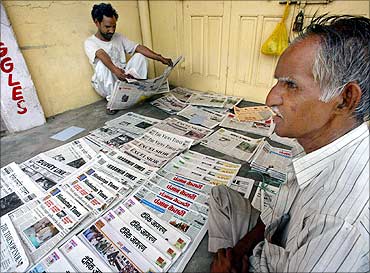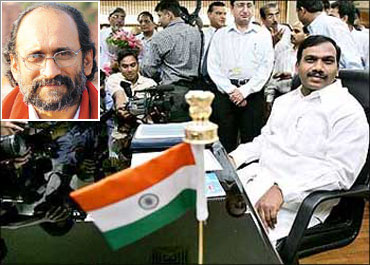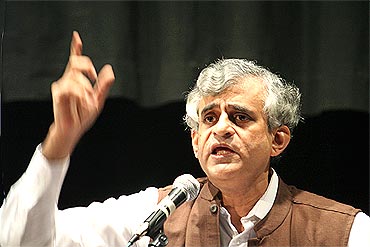
Wild and sharp contrasts are common in India. But recent events have rattled even those who are surprise-proof.
Most of the key accused in various corruption scandals are still to be charged. But author Arundhati Roy has been charged with sedition, for her comments on Kashmir. She could be arrested and tried for a crime that is punishable by life imprisonment.
And yet this is not the most bizarre contrast of recent times. Nor is it so surprising that dissent is being labelled as sedition. Nor is there any confusion among the public that expropriation of public funds is definitely a crime while the wisdom or stupidity of an author's opinion on any matter -- even Kashmir -- is debatable.
Here is what stretches our tolerance for swallowing the incredible. Free expression of opinion, whatever its quality, has been labelled seditious.
Meanwhile, commercial interests are systematically subverting the freedom of the media through the practice of 'paid news' -- and a crucial agency of our Parliamentary democracy is unwilling or unable to take corrective action.
But first a quick recap. Over the last 15 years the old-fashioned view of journalism as a social responsibility has been relegated to the sidelines.
The marketing and advertising dimensions have generally come to dominate over the editorial side. Journalists who objected were either relegated to the background or fired.
In this context the recent focus on individual journalists who feature in the Radia tapes is actually a diversion from a much larger problem.
. . .

Earlier this year a report by two members of the Press Council of India (PCI) concluded that the phenomenon of 'paid news' now '. . . goes beyond the corruption of individual journalists and media companies and has become pervasive, structured and highly organided.'
Paid News has been defined as: 'Any news or analysis appearing in any media (Print & Electronic) for a price in cash or kind as consideration.'
Ironically the PCI's handling of this study has itself become a scandal. The full original report has been buried.
This happened even though some political leaders, thinkers, journalists and media owners have openly expressed their concern about 'the pernicious influence of such malpractices'.
Researched and written by two senior journalists, Paranjoy Guha Thakurta and K Sreenivas Reddy, the report was first scheduled to be released on April 26, 2010.
But the release was deferred because, wrote Guha and Reddy, "Some council members argued that it would destroy the publishers' credibility and hurt their long-term interest."
In July the PCI released a diluted version of the report after deleting details of which newspapers and channels are engaged in the practice of 'paid news'. And yet the accompanying press release by the PCI was devastating enough. It stated that:
"Sections of the media in India have willy-nilly become participants and players in such practices that contribute to the growing use of money power in politics which undermines democratic processes and norms -- while hypocritically pretending to occupy a high moral ground. This has not merely undermined democracy in India but also tarnished the country's reputation."
. . .

It is important to note that the PCI is not some club of editors and journalists. It is a statutory, quasi judicial body established by Parliament for the purpose of preserving the freedom of the Press and of maintaining and improving the standards of newspapers and news agencies in India.
The catch is that the PCI has limited powers -- merely to admonish, reprimand and pass strictures. It has no powers to penalise those found guilty of malpractices and its mandate has still not been extended to cover electronic media.
But, in this case, there is an even more serious problem. The majority of the members of the PCI, themselves members of the media, have voted to keep the details about paid news out of the public realm.
So it has fallen upon the authors of the study to raise public awareness about this problem by speaking at various public forums -- in the hope that a public clamour against paid news might bring about a correction.
The matter has even been debated in Parliament . And yet, as the noted journalist P. Sainath recently pointed out, even the Parliamentary debate was barely mentioned by either print or television media.
It is the Election Commission of India that has put a silver lining on this dark cloud. This is partly because Guha and Reddy's brief was to particularly examine the phenomenon of paid news observed during the last Lok Sabha elections.
After holding dialogues with several stakeholders the Commission passed orders to halt the malpractice of paid news in election campaigns since this: ". . . puts undue influence on the free will of the voters, encourages the role of money power in a covert manner and disturbs level playing field in elections."
This is a significant but insufficient move to rectify the problem. What we need is an intensive public clamour for an end to paid news -- perhaps starting with the implementation of recommendations made by the Thakurta-Reddy report.
. . .

They urged that:
1. Representation of the People Act 1951 be amended to make incidence of paid news a punishable electoral malpractice;
2. The Press Council of India must be fully empowered to adjudicate the complaints of "paid news' and give final judgement in the matter;
3. Press Council Act must be amended to make its recommendations binding and electronic media be brought under its purview; and
4. Press Council of India should be reconstituted to include representatives from electronic and other media.
There is no substitute for such changes in law and policy. But, in essence, what we are dealing with is the toll of a cultural shift that happened over the last two decades.
It was sometime in the early 1990s that the head of a major media house became famous, in journalistic circles, for claiming that a newspaper is a product, no different from toothpaste or soap.
Opposition to this claim has been muted for too long. It is time for all us, as citizens, to assert that newspapers and television new channels are fundamentally social institutions.
Yes, a newspaper is also a product in the marketplace. But it is not of the market.
Rajni Bakshi is the author of the book Bazaars, Conversations and Freedom: For a Market Culture Beyond Greed and Fear, which last week won the Vodafone Crossword jury award in Non-fiction category and the Vodafone-Crossword Popular book award.